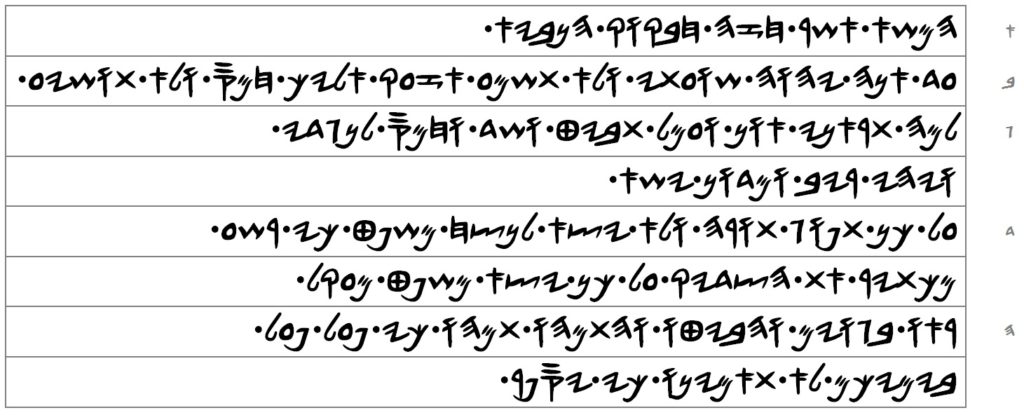
[1] ha-mash’ ashar khazah Khabakok ha-nabay’
The burden which saw Khabakok the prophet:
[2] ghad anah YA’OH sho’aithay wa-la thashamai azaik alay-cha khamas wa-la thoshay’ai
Until when YA’OH?! I have cried out for help and not will you hear! I will cry unto you violently but not will you save!
[3] lamah thar’anay ‘on wa-ghamal thabayt wa-shad wa-khamas la-nagad-ay wA-yah’ay rayb wa-madon yash’a
Why will you show me iniquity, and grievance will you see, and spoiling and violence before me, and there will be strife, and contention will be lifted up?
[4] ghal chan thapog Thorah wa-la yats’ la-natsakh mashpat chay rashai machthayr ath ha-tsadayk ghal chan yats’ mashpat maikal
Therefore it will become feeble the Thorah, and not will it go forth for ever judgment. For the wicked engulfs the righteous; therefore will it go forth wrong judgment.
[5] ra’o ba-go’aym wa-habayto wa-hathamah’o thamah’o chay pail pail ba-yamaycham la tha’amayno chay yA-sapar
Look you all among the people and consider and wonder wondrously, for a work is working in your days, not will you believe when it will be told.
COMMENTARY OF KHABAKOK 1:1-5
[Verse 1] The prophet Khabakok (his name means ‘strong embrace’) calls his book a mash’ (a burden) that he saw because his vision announces very heavy judgments to come upon the covenant nation of Ya’oh-shar-al for its disobedience. The people will experience calamities and the chief instrument who YA’OH will use to punish His people is named in verse 6. This prophet’s short book is arguably the least read book of the bible, but I am about to show you in this post just how powerful his words are by looking at the first eleven verses of the first chapter.
[Verse 2] ghad anah YA’OH (Until when YA’OH?!). These three words indicate that the period of the affliction of Ya’oh-shar-al will be a very long one. YA’OH will hide His face from His people (Yashai-Ya’oh 54:8) and seemingly abandon them and ignore their cries for help. Even when their cries reach a violent pitch, out of desperation, He will not move a finger to save them.
[Verse 3] The prophet is asking YA’OH how He can look upon all the great evils that are to befall His people whom He will scatter among the heathens in His wrath and not do anything about it.
[Verse 4] The Thorah given to the covenant nation by YA’OH via His prophet Mashah, the law which they were charged to keep and to uphold, will become feeble and faint during the calamities of the nation in the diaspora. Just as the memory of the nation, i.e. their true identity, is to cease among men (Thorah 5.32:26), so too will the light of the Thorah be extinguished. It will become numb, motionless, paralyzed, and ineffectual. Wrong judgment instead of righteous judgment is what will be going forth until the remnant of Ya’oh-shar-al are redeemed from the curses and are gathered to the wilderness.
[Verse 5] What is the work that the heathens of the world are to consider, to wonder wondrously at, and not believe when it is told to them? It is that a people will become a nation with military capabilities no one would believe if you told them. That nation is the United States. The phrase ba-yamaycham (in your days) means the days of its domination of the people of Ya’oh-shar-al. The heathens think they have enslaved and oppressed a worthless people, subhuman savages from black Africa, not knowing that the people YA’OH put under their boot, the ones He caused in His great wrath to be brought in masses by slave ships to the land of pyramids in the New World to serve out their sentence, are the seed of Ya’oh-ghakab (Jacob) fulfilling prophecy.
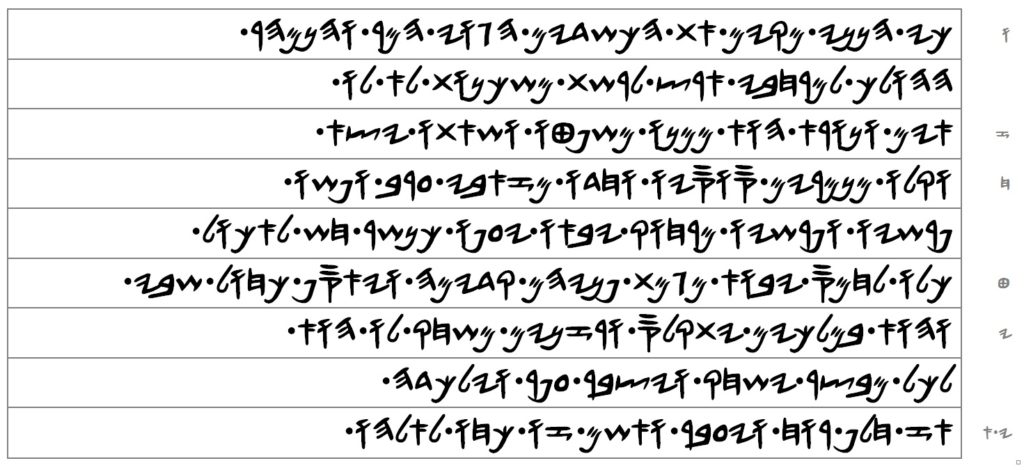
[6] chay hananay makaym at ha-Chashdaym ha-go’ay ha-mar wa-ha-namahr ha-holach la-marakhabay arats la-rashath mashchanoth la lo
For here am I, the one raising up the Chashdaym, the people bitter and the impetuous, the people going through the broad spaces of the earth to possess tabernacles not his.
[7] aym wa-nor’ ho ma-mano mashpato wa-sha’atho yats’
A terrorist and dreadful is he. From itself does its judgment and its dignity go forth.
[8] wa-kalo ma-namaraym sosay’o wa-khado ma-za’abay gharab wa-pasho parashay’o wa-parashay’o ma-rakhok yaba’o yaipo cha-nashar khash la-achol
And more swifter than cheetahs are their horses, and more fierce than wolves of the evening; and they will spread themselves his horsemen, and his horsemen from far will they come: they will fly like the eagle, the one in a rush to eat.
[9] chal-o la-khamas yabo’ magmath panay-ham kadaymah wa-ya’asap cha-khol shabay
All of him for violence will he come, she is the one being swallowed, their faces are eastward heading, and he will gather like sand the captivity.
[10] wa-ho’ ba-malachaym yathakalas wa-razanaym mashkhak lo ho’ la-chal mabtsar yashakhak wa-yatsabar ghapar wa-yalachad-ha
And he, at kings will he mock, and rulers are a laughingstock to him. He to every strong hold will he deride in contempt, and he will heap up dust, and he will capture it.
[11] az khalap rokh wA-yaibar wa-asham zo chakh-o la-alah-o
Then changed the wind, and it passed over and offended this his power to his god.
COMMENTARY OF KHABAKOK 1:6-11
[Verse 6] This verse 6 is also part of the work mentioned in verse 5 that the heathens of the world will find hard to believe when it is told to them. The prophet is using the name of the superpower of his day, namely the Chashdaym (i.e. Neo-Babylonia) of the 6th century BCE, to describe the heathen superpower that will rise up in the last days and surpass every previous kingdom in wealth and in military might.
Not to take anything away from the power and prestige of the ancient Neo-Babylonian empire, but that empire cannot possibly be what the prophet is talking about in verses 6-11, despite that he is using the name Chashdaym as a backdrop for his prophetic scenery.
For example, when the prophet says the Chashdaym are ha-mar (“the bitter,” i.e. offensive, rude, unpleasant, uncultured) wa-ha-namahr (“and the impetuous,” i.e. acting or doing something in a hurry and without thought or care), this does not fit historically with all that what we know about the kings of the ancient Neo-Babylonian empire. The military campaigns during Nabochadnezzar II’s 43-year reign (605-562 BCE) were not more bitter than the campaigns of the Neo-Assyrian empire that preceded his empire. In fact, the Neo-Assyrian military expeditions were far more savage than anything the Neo-Babylonians ever did. The relief scenes of the military exploits of the Assyrian kings carved on the walls of the Neo-Assyrian royal palaces tell their own gruesome story.
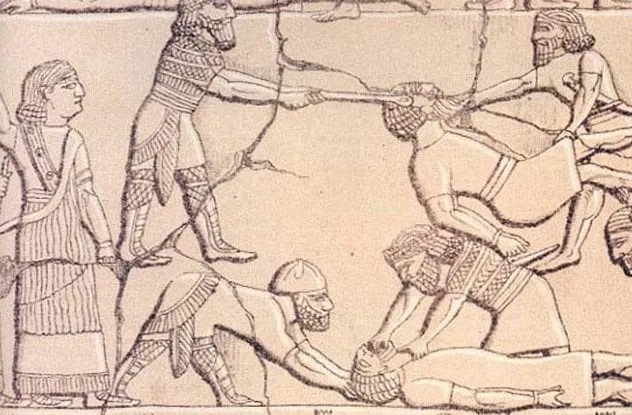
The Assyrians depicted the humiliation of their enemies in great detail on the walls of their imperial palaces. They created tablets containing every single torture the Assyrian army carried out. They cut off the limbs, gouged out the eyes, and then left those poor victims to roam around groping. The Assyrians also invented crucifixion. Their horrific cruelty against our own people was captured by the artists of the Assyrian King Sennacherib (705-681 BCE) after he attacked our city of Lachaysh (Lachish) in 712 BCE when he was co-regent of Assyria alongside his father King Sargon II (721-705 BCE).
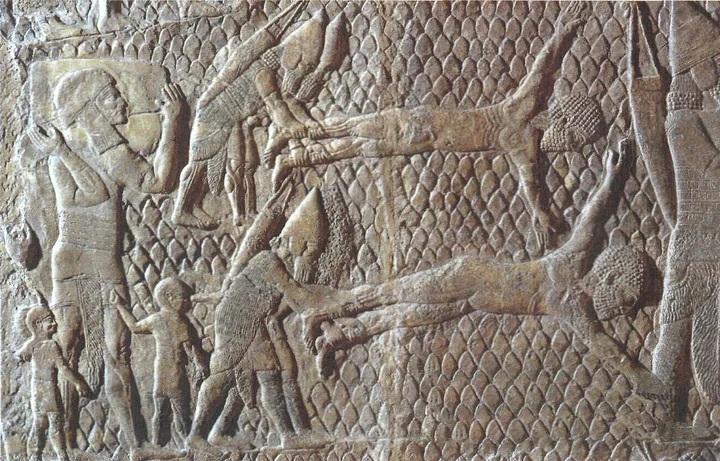
The Assyrian kings were fond of flaying their prisoners. The flaying process would start at the buttocks, thighs, or lower legs. They would cut the skin in strips and rip it off the living victim. The victim’s skin was then hung up in a visible place as a reminder for the rest of the conquered citizens. There is no evidence that the Neo-Babylonians were anywhere near as bitter or as creative with barbaric brutality as the Neo-Assyrians were. Yet the prophet in verse 6 is telling us that the Chashdaym he is talking about are “the bitter” (with a definite article), meaning they are the quintessential.
Let’s cut straight to the chase, shall we? The only people in history that surpass the people of Neo-Assyria in bitterness and cruelty are the people of the United States of America, the people who, for instance, have allowed the more than 4,000 lynchings of my people during the era of the Jim Crow south to go totally unpunished. Don’t tell me what the Romans did to rebels, or what medieval kings did, or what Columbus and the Conquistadors after him did, or what Arab Muslims did, or even what the Nazis did. All of them have paid for the atrocities they committed. All of those nations and regimes which afforded them with the means and the resources to do what they did are gone today.
The people of the United States of America, on the other hand, the people in the two pictures below, are still here. Justice has yet to be served upon this people, and no people in history have the same resume of bitterness, nor as much blood on their ledger, as these people do. Their bitterness and their impetuousness are unparalleled. The Assyrians would be embarrassed and they would be shocked if they could have witnessed how Americans have treated the people they don’t like. When did the ancient Assyrians, as cruel as they were, ever sell tickets to families with children to come and watch the scene of a black man being roasted alive just because he was black while onlookers enjoyed deviled eggs, lemonade, and whiskey in a picnic-like atmosphere? The answer is: never.
Ask me if I really care that the word picnic does not originate from the lynchings of my people. Ask me if I care that the word is not short for “pick a nigger,” and that it originally comes from the 17th century French word “pique-nique.” When you’re done asking me if I care, tell me what other people in the history of the human race gathered at picnics to be entertained by the brutal killing of a people under false accusations of criminal acts having been committed when the real reasons were the hatred of the accused’s race and their skin color.
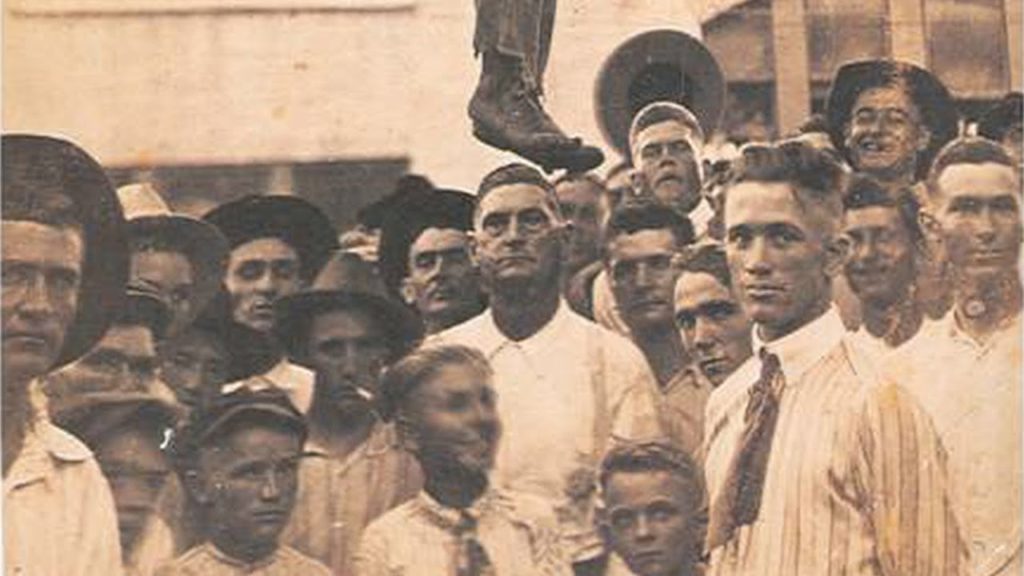
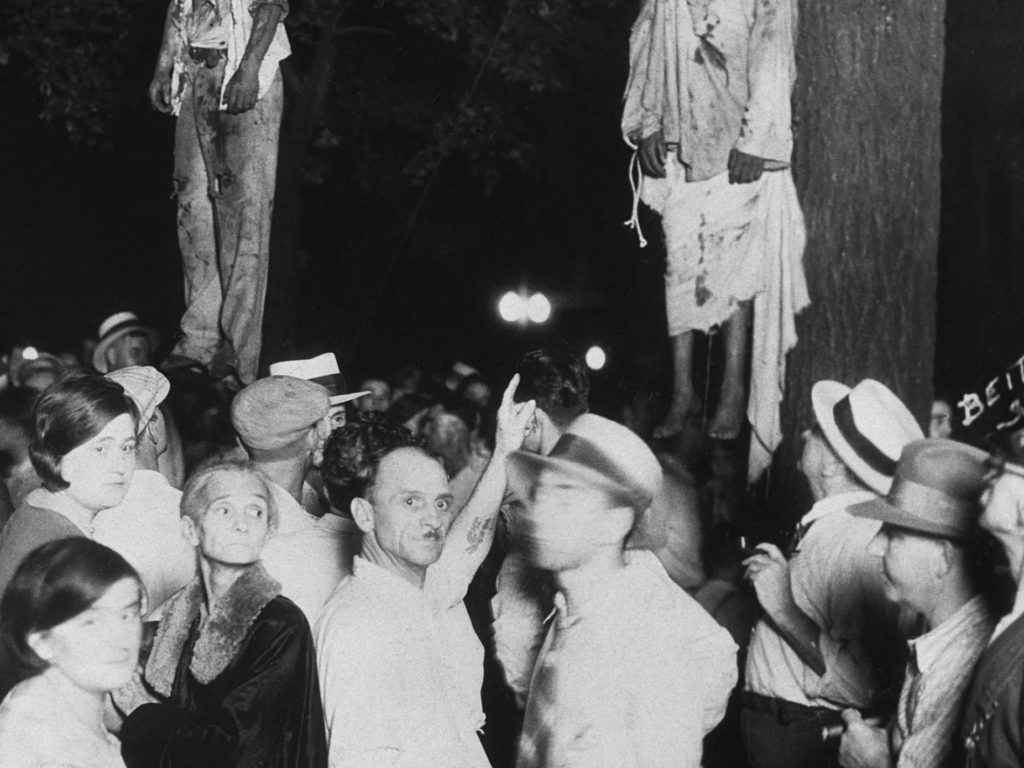
Moving on, the Neo-Babylonians did take lands that did not belong to them, like all conquering empires have done, but they did not go through the breadths of the earth in order to do so, i.e. they did not invade foreign lands all over the world. The territorial extent of the Neo-Babylonian empire was only the so-called Near East which includes Old Matsraym (Egypt). The Neo-Babylonians basically subdued their next door neighbors in the Fertile Crescent and that’s it (see map).
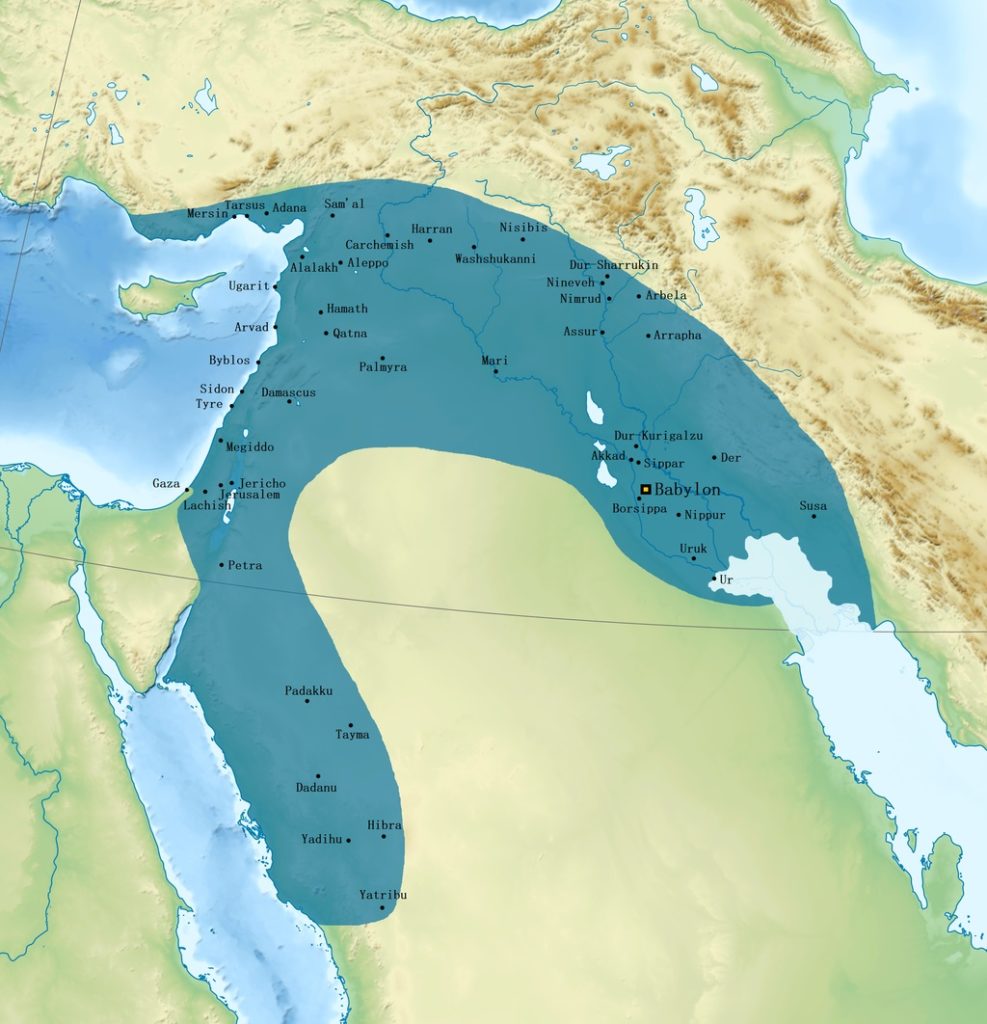
The only people who fit with the prophet’s description, if we take his words seriously about a people going through the breadths of the earth to possess dwelling places not his, is the United States of America. No nation in human history has invaded more foreign lands and fought as many foreign wars abroad as the United States of America. America’s role as the world’s police officer, resentful as that makes some nations feel, is advertised as what is necessary in order to keep the world safe and in check. The fact of the matter is that the United States of America uses its own ideals of freedom, and right and wrong, as a pretext to wage war and as a cover for its numerous atrocities, such as causing humanitarian disasters and destabilizing regions and destroying sovereign order wherever it sees fit.
The United States of America has left countless trails of bloodshed and turmoil around the world in foreign lands that do not belong to it. All of its war-mongering is done under the guise of democracy so that most people do not recognize it for what it really is. War in foreign countries is the key means by which the US executes its foreign strategy and how it maintains its worldwide hegemony. This is what the prophet Khabakok is talking about in this verse, and not about an empire that was basically confined to just the city-states and kingdoms of the Fertile Crescent.
But again, tell all of this to the average European American citizen, and he will look at you as if you have three heads and think you are completely out of your mind. There is no way his beloved country, that bastion of freedom, liberty, and justice for all, is the country being prophesied about in the book of the prophet Khabakok! His amazement and his disbelief that black slaves brought by ships and their descendants are the true chosen people and that his country is doomed for how it has treated these people fulfill the prophet’s words in verse 5 with surgical precision.
The question is not is America ever mentioned in biblical prophecy? The question is where is it not mentioned? How can the prophets of YA’OH be legit prophets if they could not foresee and talk about the strongest nation ever to exercise dominion in the history of the human race?
[Verse 7] The fierce disposition of this people against whoever they don’t like is still further depicted in verse 7. It is a true aym (a terrorist) and nor’ (dreadful), exciting fear and creating alarm when it has acquired its target. It uses its nostalgic history and the sublime speeches of its founding fathers to determine what is right in the world, and what must be the rule of conduct for the rest of the world, all according to its own standards of justice and democracy. ma-mano mashpato wa-sha’atho yats’ (from itself does its judgment and its dignity go forth).
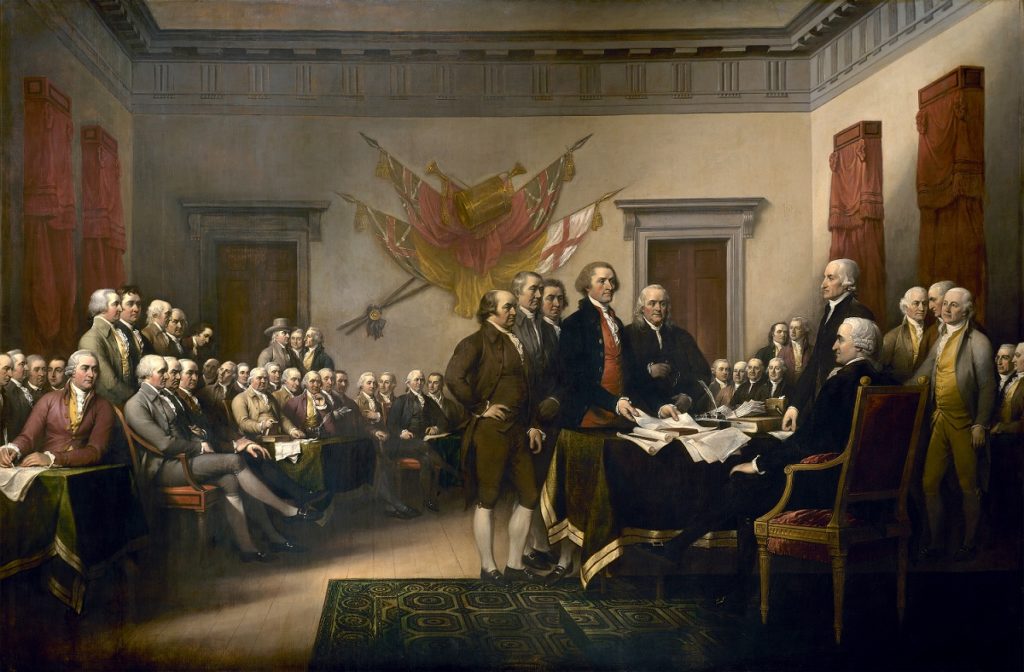
[Verse 8] The detail contained in this verse is astounding.
wa-kalo ma-namaraym sosay’o (and more swifter than cheetahs are their horses). The heathen bible translations which take the word namar/נמר to mean “leopard” are incorrect. There are no leopards that run as fast as horses. This verse begins by talking about horses that are so swift they can outrun some cat, but that cat has to already be known to run faster than horses, and therefore that cat cannot be the leopard and must be the cheetah, the fastest land animal in the world. Horses able to run faster than a cheetah is hyperbole, but the hyperbole still takes the Neo-Babylonian cavalry and chariots of the 6th century BCE off of the table for consideration. The war horses of Neo-Babylonia were not the swiftest the world has ever seen. Only the United States of America has the fastest military deployment the world has ever seen. At top speed the cheetah is moving at a snail’s pace compared to the US military.
wa-khado ma-za’abay gharab (and more fierce than wolves of the evening). As for this comparison to wolves of the evening, wolves are nocturnal animals that prowl for prey in the evening, and are their fiercest at night. Yet the ancient Neo-Babylonian army is not known for any night-fighting. Indeed, night-fighting between standing armies was very rare in ancient times. Today, many of the world’s armies and militias possess some kind of night-fighting capability, with equipment ranging from high-tech radars to sophisticated night vision goggles. However, the world leader in night combat is none other than the military of the United States of America. US forces can operate at night with near impunity, and “We Own The Night” has been a US military mantra for decades now.
wa-pasho parashay’o (and they will spread themselves his horsemen). The more than 750 US military bases in some 80 countries and colonies around the world is more bases than any nation, empire, or people have had in human history. No army has ever been as spread out as the army of the United States of America.
wa-parashay’o ma-rakhok yaba’o (and his horsemen from far will they come). This clause doubles down on the previous statement about how widespread the army will be. The United States has been fighting conventional and unconventional wars on every continent, and far from their own borders. No other people or nation in human history has ever had the overwhelming military superiority worldwide as the US military. This clause cannot be talking about the Neo-Babylonian army whose field of operation was just the Fertile Crescent. Nothing within that region was considered far away.
yaipo cha-nashar khash la-achol (they will fly like the eagle, the one in a rush to eat). The heathen bible scholars are virtually unanimous in saying that the eagle was a symbol of Neo-Babylonia and of its greatest king, Nabochadnezzar II. This is not correct. The great eagle of Ya’oh-khazak-al (Ezekiel) 17:3 is not Nabochadnezzar II. The eagle of that scripture represents the prophet Mashah (see Three Ravenous Birds). The eagle that will be spreading his wings when Adom (Edom) is to be destroyed by the people of Ya’oh-shar-al (Yaram-Ya’oh 49:22; Ya’oh-khazak-al 25:14) is also not Nabochadnezzar II. It is the same ravenous bird of Yashai-Ya’oh 46:11 (see Can You Tell Time Correctly).
The eagle of Yaram-Ya’oh (Jeremiah) 48:40 is assumed to be Nabochadnezzar II, but there is in fact zero evidence that the Moabites were conquered and exiled by Nabochadnezzar II. The Moabites were allies of Nabochadnezzar II (2 Kings 24:2). Furthermore, the Moabites still existed in their land during the time of Ghazar’a (Ezra) in the 5th century BCE, according to Ghazar’a 9:1, so their destroyer could not have been the Neo-Babylonians a century earlier. The eagle that destroyed Moab and drove all of them into foreign exile has to be the Romans, for it is in the Roman period that we learn how Moabite territory was overrun by waves of tribes from northern Arabia, such as Kedarites and (later) Nabateans.
The Romans must also be the eagle that Mashah spoke about in Thorah 5.28:49-52. This eagle cannot represent the Neo-Babylonians for the following reason. Mashah states in verse 51 that the eagle la yasha’ayr la-cha dagan thayrosh wa-yatsahr shagar alapay-cha wa-ghashtharath tsa’an-cha ghad ha’abaydo ath-cha (not will he leave to you grain, wine, or oil, the increase of your cattle, or flocks of your sheep, until he has destroyed you). But the Neo-Babylonians did leave us these things when they destroyed the kingdom of Ya’ohdah and left poor people behind to work the land (Yaram-Ya’oh 39:10; 52:16). Thus, they cannot be the eagle of Thorah 5.28:49-52. Nor can the Neo-Babylonians be the eagle of Khabakok 1:8.

SPQR is a Latin abbreviation for Senatus Populusque Romanus (Senate and People of Rome)
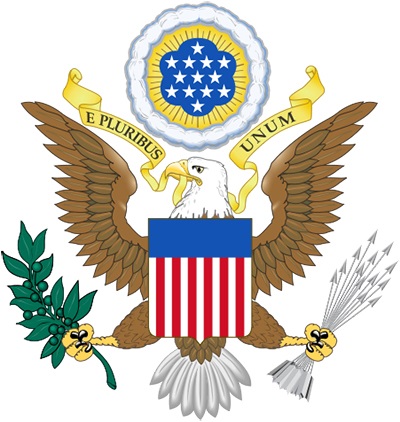
Everything about Khabakok 1:8 points to the United States of America whose Great Seal, the image of the beast, has the eagle as its central figure. The country is the offspring of Europe, and Europe is the offspring of ancient Rome, and the eagle was the most famous animal symbol associated with ancient Rome. To curry favor with Rome, the Edomite King Herod the Great erected a golden eagle outside of the gate of the Temple of Yaroshalam (Josephus, War 1.648-655; Ant 17.149-63). Like other military standards, the Romans carried the eagle standard with them into battle. The presence of the eagle meant the presence of the Roman Legion. The people of the United States of America are the Romans of modern times and they have their eagle standard too. They are the people who literally fly like the eagle and rush into combat to eat prey. Verse 6 talks about being ha-namahr (the impetuous). A recent example of this impetuousness was the rush to invade Iraq under the false pretense that Saddam Hussein still had weapons of mass destruction, when in truth he did not have them anymore, and of course the US government knew before the invasion that he did not have them anymore.
[Verse 9] chal-o la-khamas yabo’ (all of him for violence will he come). What was the Vietnam War from the 1950s to the 1970s really all about? This is a tiny country that the US could have defeated at the push of a single button, but instead it proceeded to wage war for decades and kill as many as two million people, many of whom were systematically slaughtered by US forces in the name of fighting Viet Cong communists. More than three times as many bombs were dropped on Vietnam, Laos, and Cambodia as were dropped by all sides during World War II! What in the hell was the Vietnam War all about if not just the US wanting to create a theater of war far from its own borders in which to demonstrate its capacity for violence by using Asian people as guinea pigs to test new weapons and to document the effects of the deadly chemical dioxin in Agent Orange, 20 million(!) gallons of which was dropped by the US army on these people during the war? American history is seen from a whole new light when you understand what the prophets of YA’OH have been saying about the future.
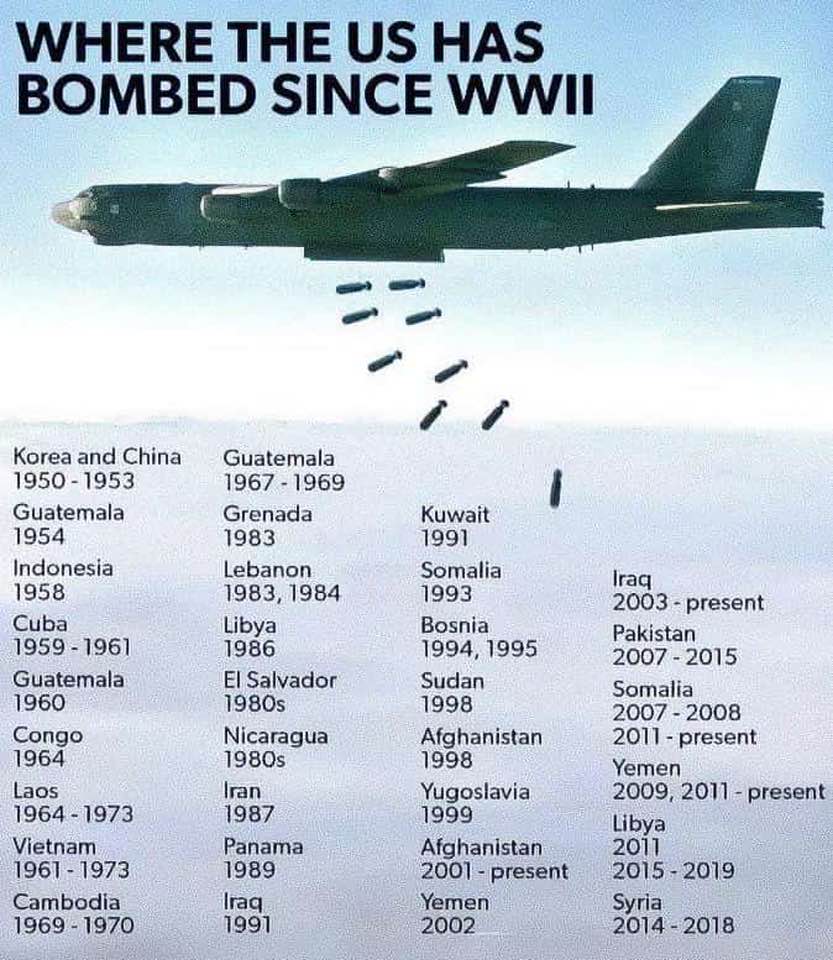
panay-ham kadaymah (their faces are eastward heading). The heathen bible interpreters don’t like this clause as it stands and want to re-word it. The 1611 Queen James version leads the way with the incorrect translation: “their faces shall sup up as the east wind.” There is no verb “shall sup up” in this clause, and the word kadaymah is a direction first and foremost and not a wind blowing from that direction. As it stands, the literal reading of the clause panay-ham kadaymah runs counter to heathen opinion that Khabakok was talking about the Neo-Babylonians, whose campaigns were primarily westward and not eastward. When you take baseless heathen opinion out of the way the meaning of this clause becomes clear. The only people in history who, after becoming a dominant military power, have endeavored their faces, i.e. aimed their armed forces, always eastwards are the people of the United States of America. From where the United States is situated geographically, Europe, Asia, Africa, Vietnam, Korea, and Afghanistan are eastward of the United States.
wA-ya’asap cha-khol shabay (and he will gather like sand the captivity). The ancient Neo-Babylonian empire did not gather up captives like sand. The hyperbolic expression makes no sense if the Neo-Babylonian empire is forced into the interpretation of this clause as the subject of the verb. The shabay (captives) in question are the people of Ya’oh-shar-al who were brought by ships to the land of pyramids in the New World during the transatlantic slave trade. The country in the New World with the largest number of Ya’oh-shar-al captives is the United States of America. That’s where the majority of our people and the majority of their twelve tribes plus Lo’ay (Levi) are living in exile. Their numbers in the United States of America are in the millions, like sand on the seashore.
[Verse 10] wa-ho’ ba-malachaym yathakalas wa-razanaym mashkhak lo (and he, at kings will he mock, and rulers are a laughingstock to him). There is no evidence that Nabochadnezzar II or any Neo-Babylonian king was mocking of other kings and disrespectful towards foreign people. Yet try naming another people who surpass the people of the United States of America in the eyes of foreigners and foreign leaders for being patronizing, arrogant, ignorant, and far more likely to be monolingual. American arrogance is no myth. The “he” in this verse 10 is referring collectively to the people, and as a people Americans are more actively involved around the world in other people’s affairs, such as in Vietnam and Afghanistan, which shows that they think they know what to do better than others, and want to fix the problems in their own way. They also like to boss other countries around, and tell them what to do. America responds by threats, mocking insults and cartoon caricatures, propaganda, or war to any country who disagrees with it.
ho’ la-chal mabtsar yashakhak (He to every strong hold will he deride in contempt). He, the United States of America, scoffs at rulers, and holds every stronghold in derision. He ridicules any foreign leader who offers a challenge to his foreign policy. The words wa-yatsabar ghapar wa-yalachad-ha (and he will heap up dust, and he will capture it) describes the dust kicked up by his tanks and armored vehicles in far away lands. The feminine suffix -ha (it) attached to the imperfect verb yalachad (he will capture) refers to any city that attempts to resist his invasion. Thus, he will continue incessantly to overthrow regimes with tempestuous rapidity, until the termination of his tyranny, which is hinted at in verse 11.

[Verse 11] az khalap rokh wA-yaibar wa-asham zo chakh-o la-alah-o (then changed the wind, and it passed over and offended this his power to his god). Not, “Then shall his mind change, and he shall pass over, and offend, imputing this his power unto his god,” as the 1611 Queen James Virus mistranslates this verse. The word rokh (wind) is the subject of the verb khalap (it changed) and rokh does not have a suffix for 3rd person.
The wind is what will change, not the mind of the tyrant people. From verse 6 down to verse 10 the wind was in his favor, but in verse 11 the wind goes against him. It will sweep over him and offend his power, which means to neutralize and destroy it. The offending wind is weather, weaponized weather and natural phenomena, things no army, not even the strongest army in human history, can contend with. What the heathens ignorantly call “Mother Nature,” we call the arrows in the quiver of YA’OH, and YA’OH is going to place His meteorological arsenal into the hands of His remnant nation who are gathering as we speak in the wilderness for the wonder years of a time, times, and a half (see Extinction Level Event: Why 2023 is significant).
I have only scratched the surface of this brief but amazing book by the prophet Khabakok. You would be stunned at what else is contained therein. YA’OH has put priceless jewels in this book. For more breakdowns of the Book of Khabakok, come to class where a ravenous bird proclaims the name of above all names from the east in fulfillment of Yashai-Ya’oh 41:25. He is my Rock and my Rock has a glorious and fearful name.
His name is YA’OH
Always has been. Always will be.
#EXODUS2023
1.15.7252 (April 5, 2023)

AMAN WA AMAN
Shalom akh, excellent info of course. CHABOB LA YA`OH.
Aman
Halalo ath YA’OH Ala’ayno la-ha-Ghayt ha-tsadayk
Shalom ma’ad akh Khorash
Chorash* (?)